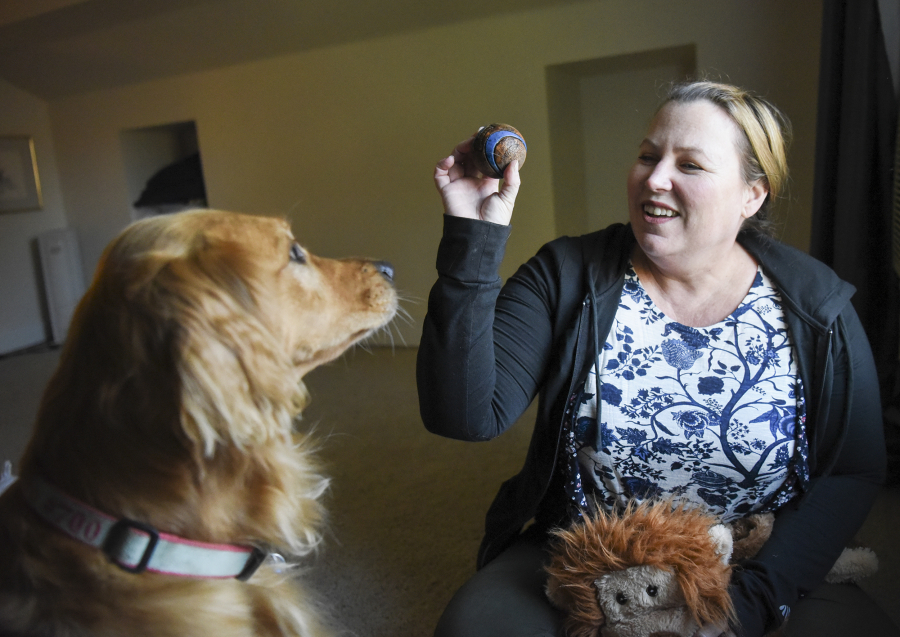Pink writing on Lily Pad’s collar introduces the 4-year-old golden retriever as “Hero #700.”
The smiling dog, owned by Vancouver woman Lori Hultman, is one of more than 3,000 so-called heroes whom researchers are following over the course of their lives in an effort to determine what causes cancer in the breed and dogs at large.
“I just love golden retrievers,” Hultman said as her dog gnawed on a chewing toy. “They’re just incredible dogs.”
The $31 million Golden Retriever Lifetime Study, funded by the Colorado-based Morris Animal Foundation, recently entered its fifth year. Carol Borchert, a spokeswoman for the nonprofit, said the study is the first of its kind due to the prohibitive cost of longitudinal studies.
“It could change vet medicine in some very important ways and shed light on things we don’t understand,” she said.
Over the course of Lily Pad and the other golden retrievers’ lives, their families and veterinarians will complete comprehensive annual surveys detailing the dogs’ lifestyles — which, for Lily Pad, means a lot of licking strangers at the neighborhood bars they visit, chasing balls and snuggling the stuffed animals Hultman calls “her babies.” But once a year, Hultman answers about 900 questions about her dog, ranging from the type of food she’s eating to the bowl she eats it from, the beds she’s sleeping in to the material its made of, and the amount of time she spends outside to the surfaces she plays on. Veterinarians are also responsible for submitting the results of an annual exam, as well as biological samples, including blood, hair and nails.
“We have millions and millions of data points collected every year on these dogs,” Borchert said.
The requirements for study participants are steep, Borchert said. Enrolled dogs had to be third-generation purebred golden retrievers and younger than 2 when their families signed up for the study. Borchert noted that golden retrievers’ “genetic purity” makes the breed an ideal model dog for this type of research. The breed also develops cancer at a higher rate than other dogs, she said. The study is tentatively slated to end when 500 dogs are diagnosed with cancer, Borchert said. Already, 20 have died from the disease.
Despite the demands, about 95 percent of study participants are in full compliance, “which is unheard of in human medicine,” she said.
“They’re so proud of their dogs,” Borchert said of the families, who swap stories in an active Facebook group. “They’re excited to be in the study.”
Erik Campen, a veterinary technician at Halsey East Animal Clinic, the Portland veterinarian Hultman takes Lily Pad to, first became aware of the study when it started five years ago. As a veterinarian — and a golden retriever owner himself — Campen is all too familiar with the breed’s predisposal to certain cancers. Researchers are looking at four major cancers — mast cell tumors, lymphoma, osteosarcoma and hemangiosarcoma — as well as other major diseases.
“It’s an epidemic in this breed,” Campen said. “They just grow cancer.”
Campen’s youngest golden retriever, Picasso, is also enrolled in the study, as are other dogs at the clinic.
“It was just a chance to get involved and see if I could in some small way contribute,” Campen said.
Hultman enrolled Lily Pad in the study when she began taking her to Halsey East Animal Clinic several years ago. For her, participation is personal. Hultman lost a black labrador, Peni Lane, to fast-acting cancer in 2000.
“It’s frustrating feeling helpless,” Hultman said.
Hultman hopes participating will help protect other families from the heartbreak of losing a dog to cancer.
“There’s so much potential in this study,” she said.
Lily Pad, meanwhile, wagged her tail.




